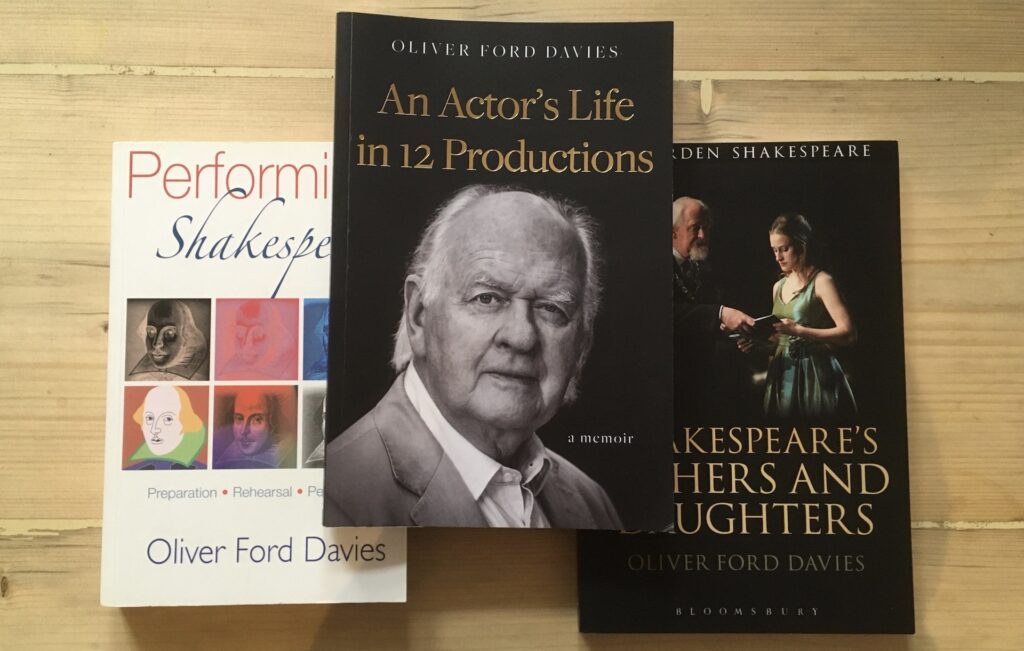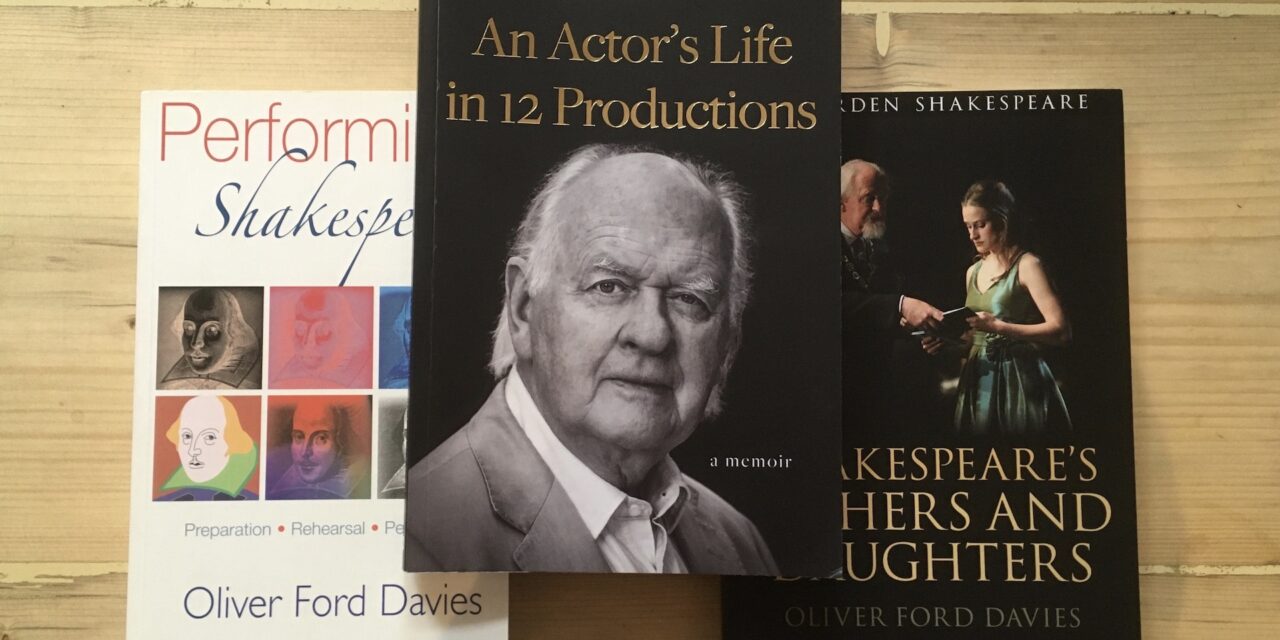
An Actor’s Life in 12 Productions: a memoir by Oliver Ford Davies, (The Book Guild 2022)
Review by Andrew Hilton, July 2023
Oliver Ford Davies has been an actor for over fifty years. He could have been an academic; he briefly lectured in history at Edinburgh University, his students there including the future Foreign Secretary in Tony Blair’s government, the late Robin Cook. The academic life was tempting, but the theatre more so and this memoir, which has won the Society for Theatre Research Theatre Book Prize 2023, proves that the gamble he took to leave Edinburgh in 1967 and ‘give acting a go’ was amply rewarded.
While he spent years in the ‘jolly useful’ category, playing largely establishment figures, and very often men a decade or two older than himself, he won an Olivier Best Actor Award for his performance in David Hare’s Racing Demon at the National Theatre in 1990, and eventually played Lear at the Almeida in 2002; he then found his name printed alongside Joan Plowright’s above the title on the posters for Absolutely! (perhaps), Martin Sherman’s version of Pirandello’s Cosi e (se vi pare), which Franco Zeffirelli directed for Wyndhams and The Haymarket theatres. He had never made a young romantic lead – never expected to – but he had indisputedly ‘arrived’ as a major player in his late middle age.
Born in Ealing in 1939, he has observed the evolution of theatre in this country over seven decades; not least the widespread abandonment of the regional repertory system. While a few repertory companies do still exist, most civic theatres now engage directors, actors, designers and composers on an ad hoc basis, show by show, very often benefitting economically from co-production with comparable managements elsewhere. Of theatre in Bristol Davies notes:
In the late 1960s the Bristol Old Vic and the Little Theatre were presenting twenty-seven plays on three stages: this was soon to drop to eight productions in the one main house.
As a nationwide phenomenon this has often been termed ‘the death of the repertory model’, a phrase as frequently used approvingly by directors for whom cross-casting from amongst a standing company has meant beastly compromise, as it is mourned by middle-aged and elderly actors who rue the loss of the ensembles and the post-Drama School training for the young that they provided. And with the loss of those long contracts a hazardous profession was made more so, casts becoming smaller to compensate for swelling administrations. Bristol Old Vic actor-employment weeks in the 1978-79 year may have totalled in excess of 800; currently it might stand at only 300 or 400, while the theatre’s management team (that is, excluding Box Office and FOH staff and technical and stage management) has increased from a mere 10 to well over 30.
Davies is right that modern audiences were no longer willing to see young actors greying their hair to play the middle-aged and elderly (as I did myself many times at Bristol); but this was the lot of the repertory company in the 60s and 70s, not because older actors didn’t want the work, but because actor pay was so very poor (a subject Davies returns to again and again). It was not just the wage itself, but for years the modest subsistence payment negotiated by Equity to support you in a period away from home would cease after a number of weeks, as if you had moved lock, stock and barrel from London or elsewhere, and were now fully resident within walking distance of the theatre. It was a throwback to the travelling reps of the eighteenth and nineteenth centuries when toddlers would be put to bed backstage in costume skips and the actors’ only home would be the company itself. If in the 20th or 21st century you had a mortgage and school-age children you could not possibly contemplate accepting a contract on those terms.
Davies is frank about money throughout. He earns well from film work, TV’s Kavanagh QC and his occasional West End theatre performances, but even after his success with Lear he has to report:
working on an Almeida Lear for six months had emptied my bank account.
What European theatre would ask a hugely respected actor in one of drama’s greatest roles to make such a sacrifice?
The book is testament, despite his frustrations with being pigeon-holed for long periods as a cleric, or as some kind of softie, or failure, in one walk of life or another, to an extraordinarily successful career – and he is not shy of quoting his most glowing reviews. At times he seems to be commuting between the RSC and the National. And the perks of working with those two companies are very real: seasons in New York and in China; sharing the stage with many of our greatest actors, being able to discuss with them the challenges of a part like Lear; the research which he loves and which generous rehearsal schedules permit; and the platform they have lent him as an author, for this is his third book, following his enormously successful Performing Shakespeare (Nick Hern Books 2007, highly recommended) and Shakespeare’s Fathers and Daughters (Bloomsbury 2017).
He is a historian of theatre, a director, and a playwright as well as an actor; a very full and varied professional life. He is left-wing, and an internationalist, rueing the parochialism of British theatre exemplified by the end of the decade of the wonderful World Theatre Seasons at the Aldwych in 1975. But he writes with a light touch. He enjoys laconic understatement and has an eye for the absurd: cast in Star Wars: The Phantom Menace in 1998, he found himself standing at the top of a huge marble staircase in Caserta, the Palace of the Kings of Naples, with the twelve-year old Keira Knightley, ‘discussing the relative merits of the Twickenham Comprehensives’. Many actors have experienced such moments, perhaps not in a big budget movie, or in Naples, or with Keira Knightley, but with comparably enjoyable collisions of the fanciful and mundane.
The accounts of individual plays – there are several more than the ‘12’ of the title – are attractive and often exhaustive. Two that particularly caught my eye were his own play, King Cromwell, which was produced by the Orange Tree Theatre in 2003, and David Edgar’s Written on the Heart, produced by the RSC in 2011 and transferred to the Duchess Theatre in London the following year. In the latter play Davies had his first RSC ‘lead’ as Lancelot Andrews, now possibly best known (if known at all) as the original author of the opening lines of T.S. Eliot’s Journey of the Magi, but in his own time a leading cleric in an era of great change and bitter controversy in the Anglican church. The play was not a commercial success, as might have been predicted for one whose subject was the composition of the ‘King James’ Bible, but I caught the production in London before its run there was curtailed and thoroughly enjoyed it. But, like Davies himself, I am fascinated by 17th English history, particularly the years leading up to the Revolution and Cromwell’s Commonwealth. I so wish I had caught King Cromwell as well.
I am less convinced by his qualified enthusiasm for Shaw’s Heartbreak House which I believe has held an undeservedly grand place in the theatre canon, and rather baulk at Shaw’s own likening of the play to Chekhov. Davies terms it ‘an immensely attractive tragicomedy’ and evidently enjoyed his experience as Mazzini Dunn, but who wouldn’t enjoy playing alongside Paul Schofield, Vanessa Redgrave, Daniel Massey, Imogen Stubbs, David Calder, Joe Melia and Felicity Kendal? I did enjoy his delicious account of Vanessa Redgrave’s experiments with Hesione Hushabye: first a bizarre proposal that she be half-Jamaican, then a day when she had evidently chosen to play her Irish. ‘It’s interesting how even the best actors often feel the need of something to cling on to, whether an accent, a costume or a piece of business.’
There is one puzzling lapse in an otherwise fiercely intelligent book. I mention it here because I have encountered it in his writing before. Of the last scene in King Lear he writes:
Shakespeare has great difficulty bringing the two unwieldy plots to a close. In the text Goneril, Regan and Gloucester all die offstage. Edgar and Edmund have to fight a duel (give the groundlings a bit of action) preceded by interminable speeches.
In Shakespeare’s Fathers and Daughters he had put it this way:
Shakespeare has lost interest in [Goneril and Regan] to the extent that neither is allowed a death scene and they expire offstage … Edgar and Edmund, however, are allowed interminable exchanges (usually heavily cut) and fight the regulation duel: it’s as if Shakespeare suddenly remembered he had to please the audience with a fight before his surprise ending.
I have directed the play twice and found the orchestration of the final scene beyond reproach. More precisely, the verbal and martial confrontation between Edgar and Edmund seems to me superb – the at last assured Edgar showing up the hollowness within the braggart Edmund – and the custom of thinning it I believe is horribly mistaken. And the offstage deaths? Surely it is Lear’s own that must take centre stage. As Albany says of Edmund’s onstage but off-focus death, ‘That’s but a trifle here’.
That cavil apart, I must recommend this book as an important record of theatre over the last seventy years, a period in which our diverse industry has changed almost beyond recognition. The Afterword’s summary of these changes is alone worth the very modest £9.99 cover price and The Society for Theatre Research prize is appropriate and well deserved.
Andrew Hilton was a member of the National Theatre Company from 1976 to 1978, and of the Bristol Old Vic from 1978 to 1983. He founded Shakespeare at the Tobacco Factory in 1999. His book, Shakespeare on the Factory Floor, was published by Nick Hern Books in 2022.
Photo credits: Fatima Namdar, Ellie Kurttz, Rocco Redondo


